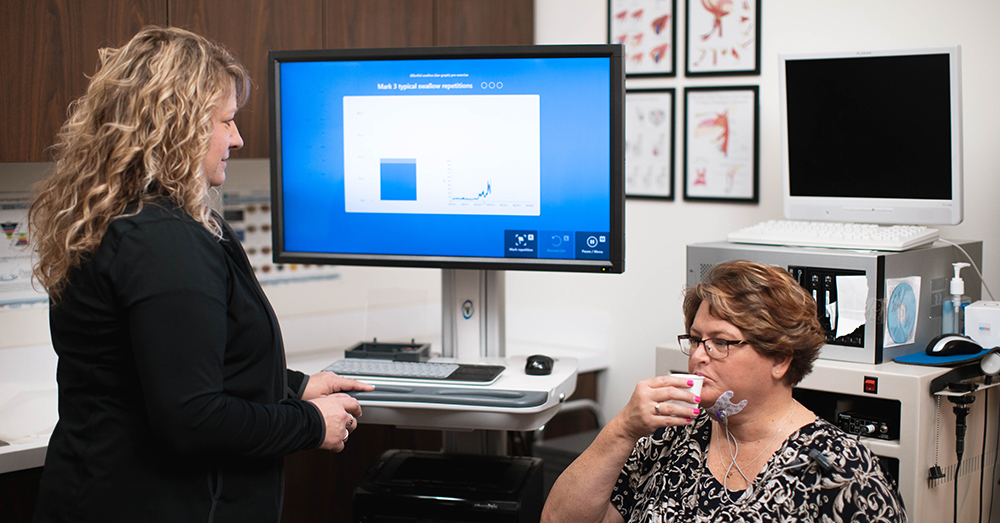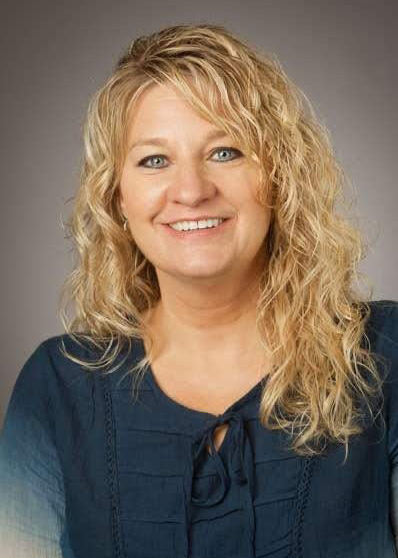Living with Dysphagia
During Better Hearing and Speech Month, let’s discuss the causes and treatments of dysphagia, a swallowing disorder.

Dysphagia is caused by a variety of diseases and conditions
May is Better Hearing and Speech Month (BHSM). Established in 1927 by The American Speech-Language-Hearing Association (ASHA), BHSM provides an opportunity to raise awareness about hearing and speech problems, and to encourage people to think about their own hearing and get their hearing checked.
Dysphagia is a swallowing disorder that affects a person’s ability to eat or drink, affecting between 300,000 and 700,000 people in the United States each year.
We spoke with Angela Van Sickle, Ph.D., CCC-SLP, about what it is like to live with dysphagia, as well as how it is treated. Van Sickle is an Assistant Professor at the Center for Speech Language and Hearing at the TTUHSC School of Health Professions.
What Causes Dysphagia?
“You don’t wake up one day and have this problem in isolation,” Van Sickle says. “It is typically related to another diagnosis.”
Dysphagia is a symptom caused by a variety of diseases and conditions, including:
- Congenital and developmental disorders (e.g., cleft lip/palate, Down syndrome)
- Head and neck cancers
- Pulmonary conditions (e.g., chronic obstructive pulmonary disease)
- Congenital or acquired neurological conditions, such as stroke, dementia, amyotrophic lateral sclerosis (Lou Gehrig’s disease), Parkinson's disease, muscular dystrophy, cerebral palsy, and many more.
Warning Signs of Dysphagia

Angela Van Sickle, Ph.D., CCC-SLP
Van Sickle says a common warning sign of dysphagia is chronic coughing when eating.
“Sometimes food is redirected into the airway,” she says. “A person may also experience coughing and watering eyes. The body responds when something goes into the airway.”
We’ve all had the experience of having something “go down the wrong tube.” If this is something happening on a regular basis causing coughing and choking, it may be dysphagia.
Other signs and symptoms include difficulty gaining weight in children, unintentional weight loss in adults, and recurrent lung infections.
The Effects of Dysphagia on Daily Functioning
“In our society, a lot of things revolve around food and eating, from celebrations to work meetings,” Van Sickle explains. “If people have trouble eating, it may affect them and their family.”
Plus, it’s more difficult to go out to eat if the person with dysphagia is on a special diet.
For adults, it can be embarrassing because food and eating are so intertwined with our social lives.
Treating Dysphagia
“Our goal is to help people eat, not take away foods,” Van Sickle says. “That should be the goal, and to have a better quality of life.”
When working with a patient who has dysphagia, Van Sickle says the therapist has to isolate the problem before they can help treat it.
“There are 15 events that happen when we swallow,” she explains. “We close our vocal folds to protect the airway, for example.”
Specific treatment strategies address specific issues, and there is no strategy that is one size fits all. For example, Van Sickle described the “effortful swallow” strategy, which requires a patient to concentrate and use more effort or to consciously contract the muscles more when swallowing.
Conclusion
Van Sickle has 29 years of experience treating adults. After 15 years, she returned to school, earned her Ph.D., and now hopes her research will continue to make a difference.
“Sometimes, people with dementia cannot voice their wants and needs,” she says. “Sometimes, their diet is changed for various reasons. For example, they may go to the hospital for something unrelated, and their diet is changed due to their cognitive status. When they return home or to their living facility, the diet may never be changed back or they may not be rehabilitated.”
It’s unfortunate that a person with dementia may be stuck with a puree diet, for instance, if they can be elevated to a higher level and enjoy regular food again, she says.
Van Sickle grew up near a retirement community and would visit the residents as a pre-teen.
“I’m trying to be the voice for those sweet people,” she says.
To learn more about dysphagia visit the American Speech-Language-Hearing Association.
Related Stories
The John Wayne Cancer Foundation Surgical Oncology Fellowship Program at Texas Tech University Health Sciences Center Announced
TTUHSC is collaborating with the John Wayne Cancer Foundation and has established the Big Cure Endowment, which supports the university’s efforts to reduce cancer incidence and increase survivability of people in rural and underserved areas.
Making Mental Health a Priority in the New Year
Sarah Mallard Wakefield, M.D., a psychiatrist with Texas Tech Physicians, talks about strategies to combat widespread and growing anxiety.
TTUHSC Dean to be Inducted into the National Academies of Practice as Distinguished Fellow
Gerard E. Carrino, Ph.D., MPH, dean of the TTUHSC Julia Jones Matthews School of Population and Public Health, will be inducted into the National Academies of Practice (NAP) as a Distinguished Fellow of the Public Health Academy.
Recent Stories
The John Wayne Cancer Foundation Surgical Oncology Fellowship Program at Texas Tech University Health Sciences Center Announced
TTUHSC is collaborating with the John Wayne Cancer Foundation and has established the Big Cure Endowment, which supports the university’s efforts to reduce cancer incidence and increase survivability of people in rural and underserved areas.
TTUHSC Receives $1 Million Gift from Amarillo National Bank to Expand and Enhance Pediatric Care in the Panhandle
TTUHSC School of Medicine leaders accepted a $1 million philanthropic gift from Amarillo National Bank on Tuesday (Feb. 10), marking a transformational investment in pediatric care for the Texas Panhandle.
Texas Tech University Health Sciences Center Permian Basin Announces Pediatric Residency Program Gift
TTUHSC Permian Basin, along with the Permian Strategic Partnership and the Scharbauer Foundation, Feb. 5 announced a gift that will fund a new pediatric residency.
